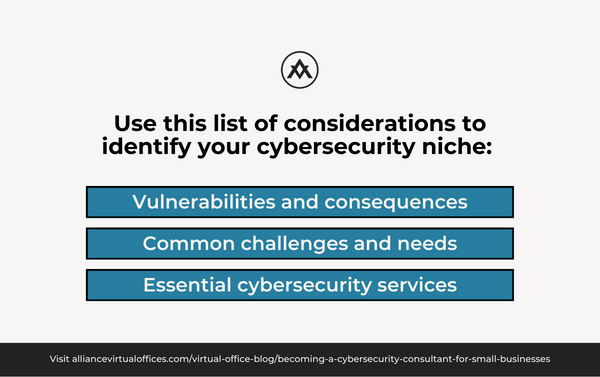- Role and importance of cybersecurity consultants for small business
- Steps to becoming a successful cybersecurity consultant
- Building a consulting business: LLC formation and business address
Q: Can anyone start a cybersecurity consulting small business? What steps do I need to take to start a cybersecurity business?
A: Yes, although a background in IT is useful, anyone can start a cybersecurity business. Aside from familiarizing yourself with the courses and certifications that will help you understand the industry, you should familiarize yourself with basic business fundamentals to ensure that you can apply the information you’ve learned.
Small business cybersecurity consulting is an industry that may seem difficult to break into, but as more and more businesses pop up, the demand for cybersecurity firms is only increasing. A surprising statistic to most entrepreneurs is that 43% of annual cyber attacks happen to small businesses.
Large corporations and companies with endless consumer data usually seem like the most obvious targets for cybercriminals, but because of the extensive budgets these businesses have access to, they are much more difficult targets.
Because criminals aren’t going to simply stop trying, the next best option is small businesses without the same access to capital and security protocols.
In 2020, small businesses were hit with more than 700,000 attacks for a surprising $2.8 billion in damages.
This is where small business cybersecurity consulting firms come into play. As a business owner, moving into cybersecurity consulting provides countless opportunities and endless room for growth; the key is taking the time to understand best practices first.
As a small business cybersecurity consultant, your clients will turn to you to protect their customers, so you must be capable of providing real security for other businesses. Cybersecurity consultants help their clients create an environment that not only welcomes new customers with the promise of safe data but also incentivizes existing customers to remain loyal indefinitely.
In this article, we’ll show you the role and importance of cybersecurity consultants for small business, explain the steps necessary to become a successful cybersecurity consultant, and finally, look at LLC formation and preferred business addresses to help legitimize your operations.
If a cybersecurity consulting career has ever sounded interesting, you’re in the right place. For more on cybersecurity expertise, cyber threat analysis, and general data security tips, keep reading.
- Role and importance of cybersecurity consultants for small business
- Steps to becoming a successful cybersecurity consultant
- Building a consulting business: LLC formation and business address
Understanding the cybersecurity landscape for small businesses
To understand how to start successful small business cybersecurity consulting operations, it’s imperative to understand cybersecurity itself.
The more comfortable you are with navigating cybersecurity, the more comfortable you’ll be starting a business. Because you’re going to be dealing with sensitive information, it is paramount to learn as much as possible about best practices and other general cybersecurity information.
Read more: Navigating Cybersecurity: Safeguarding Your Remote Business
Remember, because cybersecurity deals with any business, there are opportunities for entrepreneurs to leverage past experiences in their new businesses.
For example, if you worked in hospitality before starting a business, you likely have expert knowledge in that field that can be used to give you a stronger frame of reference with your new business.
Although you’ll still likely need to do additional research before starting your business, we’ve put together a brief list of three key aspects of cybersecurity to help you get started.
Vulnerabilities and consequences
Small businesses are enticing for cyber criminals primarily because they are more likely to lack the robust defense mechanisms commonly found in larger corporations.
The consequences of inadequate cybersecurity measures can be severe, ranging from financial losses and compromised customer data to reputational damage.
The modern market values trust more than almost anything; a single cybersecurity breach can erode years of hard-earned confidence in clients and partners.
Consumers want to feel like their data is safe, and corporations often have better pricing, similar offerings, and robust data protection measures. Although many consumers want to deal with businesses that align with their feelings, they’re unlikely to sacrifice pricing, quality, and safety solely to align with a company.
CyberSecOp, a leading cybersecurity expert, highlights the vulnerability of small businesses, emphasizing that limited resources and a perception of being inconspicuous make them attractive to cybercriminals.
As a business owner, it’s exponentially easier to destroy trust than rebuild it. When your customers experience a data breach at your hands, you’ll need to spend a considerable amount of time convincing them that it was a one-time mistake.
Common challenges and needs
Several factors contribute to the cybersecurity vulnerabilities of small businesses. Recognizing these challenges is essential for cybersecurity consultants aiming to tailor effective solutions.
- Limited resources
Small businesses often operate with constrained budgets, limiting their ability to invest in sophisticated cybersecurity measures. Unlike larger corporations with dedicated IT departments and substantial financial allocations for cybersecurity, smaller enterprises may struggle to keep pace with evolving threats.
- Lack of awareness
Many small business owners may not fully comprehend the extent of cybersecurity threats or the potential consequences of a breach. This lack of awareness can lead to a lax approach to cybersecurity, with entrepreneurs underestimating the importance of robust protective measures.
- Inadequate employee training
Employees in small businesses may not receive comprehensive training on cybersecurity best practices. This gap in knowledge makes them susceptible to falling prey to common tactics employed by cybercriminals, like phishing attacks.
- Complex regulatory landscape
Navigating the complex landscape of cybersecurity regulations can be challenging for small businesses. Depending on the industry and geographical location, businesses may need to comply with various data protection laws.
- Dependence on third-party vendors
Small businesses often rely on third-party vendors for various services, including IT infrastructure and software, which introduces additional risks despite being cost-effective. Consultants need to assess and mitigate these risks by ensuring vendors adhere to robust security standards.
- Scalability concerns
As small businesses grow, their cybersecurity needs to evolve. Consultants must develop scalable solutions that can adapt to the changing requirements of a growing enterprise.
This involves anticipating future challenges and implementing measures that can accommodate increased complexity without compromising security.
Atlant Security sheds light on the specific challenges small businesses face in cybersecurity. One notable challenge is the lack of dedicated IT personnel or departments, leaving these businesses with limited expertise to navigate the evolving cyber threat landscape.
In addition, the need for cost-effective solutions often leads to compromises in cybersecurity infrastructure.
Understanding these challenges is crucial for aspiring cybersecurity consultants who aim to tailor their services to address the unique needs of small businesses.
Essential cybersecurity services
To fortify small businesses against cyber threats, CyberSecOp recommends a suite of essential cybersecurity services. Among these, risk assessments play a pivotal role in identifying vulnerabilities specific to the business.
This proactive approach allows consultants to devise targeted strategies to mitigate potential risks.
Data security is another critical aspect, focusing on safeguarding sensitive information from unauthorized access or breaches. Incident response services, like the ones suggested by CyberSecOp, ensure that businesses are well-equipped to handle and recover from security incidents promptly.
By understanding and implementing these services, cybersecurity consultants can offer comprehensive protection to small businesses navigating the digital landscape.
Steps to becoming a cybersecurity consultant for small businesses
Now that you’re familiar with basic cybersecurity ideas and understand why a small business cybersecurity consulting firm is a good decision, let’s look at the steps you’ll need to take to start this business.
As always, any small business will benefit immensely from one of Alliance’s Live Receptionists. Using this service to improve the customer experience is a great way to increase customer loyalty and incentivize new customers to try your business.
Read more: Virtual Receptionists: The Future of Business Communication
Although many entrepreneurs think of cybersecurity as an industry that doesn’t need to worry about the customer experience, this couldn’t be further from the truth. Creating a healthy relationship with your customers and clients is paramount to cultivating a long-lasting business.
Read more: The Customer Connection: Is a Live Receptionist Your Key to Success?
Not only do healthy customer connections benefit businesses’ retention and scalability but they also may help businesses receive the benefit of the doubt. If your business experiences a data breach, a healthy relationship with your clients will help negate some of the damage done by the security mistake.
Below, we’ve listed the steps any entrepreneur should follow to prepare themselves to start a small business cybersecurity consulting firm.
Educational background and certifications
A robust educational foundation is pivotal for aspiring cybersecurity consultants.
While formal education in cybersecurity or related fields is beneficial, it’s not the only pathway into the profession. Degrees in computer science, information technology, or cybersecurity are valuable assets, providing a comprehensive understanding of the underlying principles.
That said, certifications play a crucial role in validating expertise. Industry-recognized certifications like the Certified Information Systems Security Professional (CISSP), Certified Information Security Manager (CISM), and CompTIA Security+ are highly regarded.
These certifications don’t just enhance credibility, they also demonstrate a commitment to mastering the many facets of cybersecurity.
Aspiring consultants need to tailor their educational pursuits to align with their career goals. Specialized certifications in areas like ethical hacking, penetration testing, or risk management can differentiate consultants and address specific needs within the small business cybersecurity landscape.
Gaining practical experience
Theoretical knowledge is incomplete without hands-on experience.
Cybersecurity consultants need practical skills to navigate the evolving threat landscape effectively. Internships and entry-level positions offer invaluable opportunities to apply classroom learning in real-world scenarios.
Internships with reputable cybersecurity firms, IT departments, or even government agencies provide exposure to diverse challenges. These experiences don’t just cultivate technical skills but also foster a nuanced understanding of cybersecurity within different contexts.
Small businesses value practical experience, making it a critical component for success as a consultant in this sector.
Staying current and continuous learning
Cybersecurity is characterized by rapid advancements and ever-evolving threats. Successful consultants stay ahead of the curve by staying informed about the latest trends, technologies, and vulnerabilities.
Continuous learning isn’t just a recommendation; it’s a professional imperative.
Participating in webinars, attending conferences, and joining professional organizations keeps consultants abreast of emerging threats and industry best practices. Engaging with the cybersecurity community through forums and networking events provides valuable insights and facilitates knowledge exchange.
Embracing a mindset of continuous improvement is non-negotiable. Regularly updating skills and pursuing advanced certifications ensures that consultants remain relevant and capable of addressing the evolving cybersecurity needs of small businesses.
The journey to becoming a cybersecurity consultant for small businesses involves a judicious blend of education, practical experience, and an unwavering commitment to staying current. By investing in these foundational elements, aspiring consultants can lay the groundwork for a successful and impactful career in safeguarding small businesses from cyber threats.
Establishing your cybersecurity consulting business
Now that you have the pieces, it’s time to show you how to establish a cybersecurity consulting business. Doing this requires a strategic roadmap that encompasses legal considerations, credibility enhancement, effective strategies, and optimizing profitability.
Read more: Everything You Need to Optimize Your Net Profit
We’ve listed three points below that delineate the key steps in this crucial phase of your business creation.
- Setting up your cybersecurity consulting business
Launching a cybersecurity consulting business involves more than just technical expertise; it requires a solid foundation in legal and business considerations. Here are the steps you’ll need to take.
- Legal structure
It’s imperative to choose the right legal structure for your business before you start consulting. Many cybersecurity consultants opt for a standard LLC structure due to its flexibility and liability protection.
Forming an LLC doesn’t just shield personal assets, it also simplifies tax obligations.
- Regulatory compliance
Ensuring compliance with industry regulations is vital to the long-term success of your business. Cybersecurity consultants often deal with sensitive information, and adherence to data protection laws is non-negotiable.
Familiarize yourself with regulations like the General Data Protection Regulation (GDPR), Health Insurance Portability and Accountability Act (HIPAA), and other relevant laws depending on the geographic scope of your services.
- Insurance coverage
Mitigating risks is intrinsic to the success of any small business cybersecurity consulting firm. Acquiring appropriate insurance coverage, including professional liability insurance, protects consultants from potential legal liabilities arising from their services.
Insurance not only instills confidence in clients but also safeguards the business in case of unforeseen circumstances.
- Contracts and agreements
Clearly defined contracts and agreements are the bedrock of successful consulting engagements.
Drafting comprehensive agreements that outline the scope of services, responsibilities, timelines, and payment terms is essential. Legal consultation during this phase can prevent misunderstandings and establish a solid legal framework for the business.
- Professional business address for enhanced credibility
The credibility of a cybersecurity consulting business is often evaluated based on professionalism and perceived legitimacy.
Using a professional business address, like those offered by Alliance Virtual Offices, offers several distinct advantages.
- Enhanced professional image
A professional business address projects an image of legitimacy and permanence. This is particularly crucial for consultants who may not have a physical office but still wish to convey a credible and established presence.
- Privacy and security
Cybersecurity consultants deal with confidential and sensitive information. A professional business address adds a layer of privacy and security by keeping personal addresses confidential.
This is instrumental in building trust with clients who prioritize the security of their data.
- Mail handling services
Alliance Virtual Offices doesn’t just provide a prestigious business address; they also offer tiered mail handling services.
This includes mail forwarding and virtual mailboxes, allowing consultants to manage their correspondence efficiently, even if they’re not physically present at the business address.
- Marketing and networking strategies
Building a robust client base and establishing a reputable brand requires a concerted marketing and networking effort. Here are effective strategies for propelling your cybersecurity consulting business.
- Online presence
Create a professional website showcasing your expertise, services, and client testimonials. Optimize the website for search engines to ensure visibility and leverage social media platforms to engage with the cybersecurity community and potential clients.
- Content marketing
Share your knowledge through blogs, whitepapers, and other informative content. Positioning yourself as a thought leader in cybersecurity enhances credibility and attracts clients seeking expert guidance.
- Networking events
Attend industry-specific conferences, seminars, and networking events. Establishing a presence in the cybersecurity community provides opportunities to connect with potential clients and partners, and stay informed about industry trends.
- Collaborate and partner
Forge collaborations with other consultants or businesses in related fields. Partnerships can extend your reach and offer complimentary services, creating a mutually beneficial ecosystem.
- Client referrals
Delight clients with exemplary service and satisfied customers will likely become ambassadors for your business, contributing to a positive reputation and generating organic referrals.
Essentially, the establishment phase of a small business cybersecurity consulting firm is a multifaceted endeavor that encompasses legal structuring, credibility enhancement, and strategic marketing.
By diligently navigating these considerations, aspiring consultants can position their businesses for success in the competitive cybersecurity landscape.
Small business cybersecurity consulting and Alliance Virtual Offices
Starting a small business cybersecurity consulting firm demands a blend of education, practical experience, and strategic business acumen.
To succeed, you must prioritize continuous learning, build practical skills, and forge professional alliances. Additionally, creating a business infrastructure that helps you on your business journey is paramount to avoid frustrating logistic bottlenecks.
Continuous learning helps you stay ahead of evolving cybersecurity trends to stay at the forefront of the field, building practical skills gives you the hands-on experience necessary to prove to clients that you’re serious, and forging professional alliances allows you to establish connections that offer future support and opportunities.
Consider the benefits of using a Virtual Office, complete with a professional business address, mail handling, access to meeting rooms and coworking spaces, and more, from Alliance Virtual Offices. Elevate credibility, enhance privacy, and enjoy the flexibility of Virtual Offices.
Further reading
- The Customer Connection: Is a Live Receptionist Your Key to Success?
- Virtual Receptionists: The Future of Business Communication
- Navigating Cybersecurity: Safeguarding Your Remote Business
- Everything You Need to Optimize Your Net Profit
Alliance Virtual Offices offers Live Receptionists, Virtual Offices, and more for anyone hoping to start a small business cybersecurity consulting firm.
Cybersecurity consulting requires a vast understanding of the field and the ability to run a successful business.
Contact us today to see how Alliance can help you create a small business cybersecurity consulting firm and be sure to check out our Virtual Office Blog for more information!



